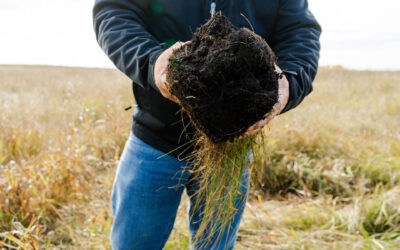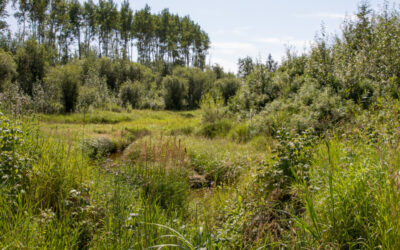PRESS RELEASE – FOR IMMEDIATE RELEASE
PORT COLBORNE, July 19, 2018 — Environment and Climate Change Canada grants ALUS Canada $600,000 to improve Lake Erie water quality.

In Port Colborne on July 19, 2018, Environment and Climate Change Canada announced a $600,000 grant to ALUS Canada to help improve Lake Erie water quality. From L to R: Bryan Gilvesy, CEO of ALUS Canada; MP Chris Bittle; the Hon. Catherine McKenna, Minister of Environment and Climate Change Canada; Krystyn Tully of Swim Drink Fish Canada; Chief Stacey LaForme of Mississaugas of the New Credit; MP Vance Badawey.
ALUS Canada, A Weston Family Initiative, is delighted to announce it has received $600,000 from Environment and Climate Change Canada’s Great Lakes Protection Initiative (GLPI) to improve water quality in Lake Erie.
“We are thrilled with this important new funding from the Great Lakes Protection Initiative,” said Lara Ellis, Director of Strategic Initiatives at ALUS Canada. “This will allow us to quickly establish more natural infrastructure projects on agricultural land in the Lake Erie Basin, and to quantify their beneficial effects through modelling research.”
Specifically, ALUS will support participating farmers to restore, enhance and maintain 75 acres of wetlands, riparian buffers, native prairie grass, shelterbelts and erosion-control projects through renewable, five-year contracts. These types of projects have been shown to significantly reduce the level of phosphorus in local waterbodies.
“ALUS Canada is doing really important work. We know that we need to be working with farmers when it comes to water quality, so it’s a very important partnership,” said Minister Catherine McKenna at the July 19 announcement, held on the shores of Lake Erie.
This funding is part of a larger commitment by the Government of Canada to help improve water quality in the Great Lakes, such as by reducing soluble phosphorous contributions to Lake Erie by 40% compared to 2008 levels, to fight and nuisance algae.
“ALUS projects benefit the entire Great Lakes Basin by improving water quality, producing cleaner air and creating more wildlife habitat,” said CEO Bryan Gilvesy. “We invest in farmers, ranchers and community partners to provide effective solutions to some of the biggest environmental problems of our day.”
Three of the 21 ALUS communities already established across Canada will benefit from the new GLPI grant—ALUS Norfolk, ALUS Middlesex and ALUS Chatham-Kent.
“We are excited to play an important role in this initiative,” said Bob Fields, Director of Environmental Services at Norfolk County. “Our work with ALUS Canada is another example of our environmental leadership, in this case water stewardship. Working with local farmers through Norfolk’s ALUS Partnership Advisory Committee will be instrumental in identifying the best sites to develop ALUS projects for the highest environmental impacts in our County.”
The GLPI grant also supports ALUS Canada in conducting a $300,000 cost-benefit analysis to evaluate the effectiveness of these ALUS projects for phosphorus reduction within the priority regions identified by the GLPI. ALUS is delighted to work with Dr. Wanhong Yang, of the University of Guelph, who has pioneered an innovative tool, known as “IMWEBs” (Integrated Modelling for Watershed Evaluation of Beneficial Management Practices).
ALUS Canada recognizes its key partners in this Great Lakes natural infrastructure project—Norfolk County, the University of Guelph and Innotech Alberta. ALUS has strong community afiiliations, such as with the Lower Thames Valley Conservation Authority who has partenered with us to launch the ALUS Chatham-Kent program. Many local ALUS projects are additionally supported by Long Point Region CA and other partners.
ABOUT ALUS
ALUS Canada, A Weston Family Initiative, is a national program helping farmers and ranchers to produce cleaner air, cleaner water, more biodiversity and other ecosystem services in their communities, through wetlands, riparian protection zones, native tall-grass prairie buffers and other impactful ALUS projects. There are currently more than 18,500 acres enrolled in the ALUS program by 575 participants, from 21 communities in five provinces, and the program is rapidly expanding.
As a recent Alberta Emerald Award-winner—and guided by a Clean50/Clean 16 Award-winning team—ALUS Canada is a recognized leader in sustainability that is revolutionizing the way Canadians support the environment. With funding from many sources, including our primary philanthropic partner The W. Garfield Weston Foundation, ALUS Canada has so far disbursed nearly $6.5 M in funding to ALUS communities across Canada; this investment is multiplied by farmers, ranchers and communities on the ground.
Stay connected: ALUS.ca Twitter Instagram Facebook YouTube
FOR PHOTOS AND FURTHER INFORMATION, CONTACT: Bridget Wayland, Director of Communications, ALUS Canada, 514-770-3001, [email protected]



